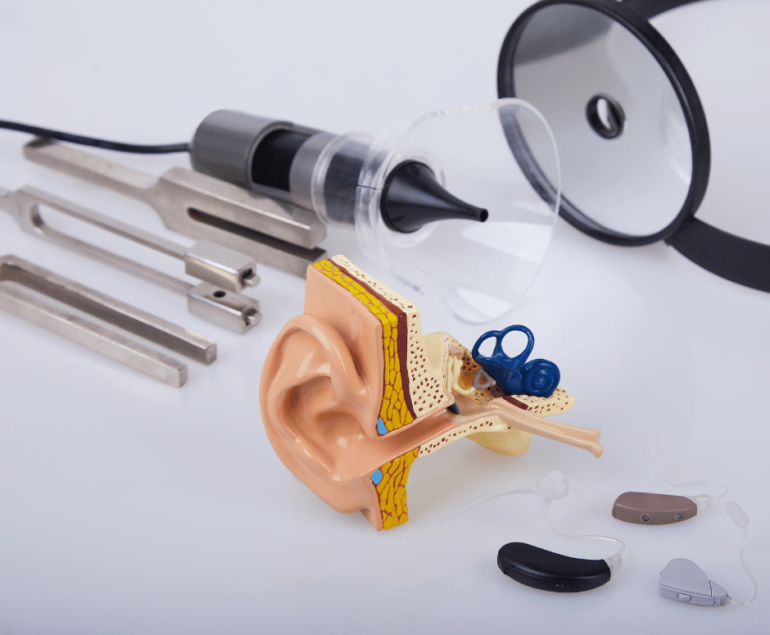In today’s fast-paced world, mental health issues have become increasingly prevalent, prompting more individuals to seek treatment through various medications. However, an often-overlooked aspect of mental health medication usage is its potential impact on hearing health. As an ENT surgeon, I am deeply invested in exploring and understanding this connection to better serve my patients and raise awareness among the general population.
Introduction to Mental Health Medications and Hearing Loss
Mental health medications encompass a wide range of drugs prescribed to manage conditions such as depression, anxiety, bipolar disorder, and schizophrenia. These medications work by altering brain chemistry to alleviate symptoms and improve overall well-being. On the other hand, hearing loss refers to a partial or total inability to hear sounds. It can range from mild to profound and may affect one or both ears.
Types of Mental Health Medications
Several classes of mental health medications exist, each with its own set of effects and potential side effects. These include antidepressants, which regulate mood and emotions; antipsychotics, used to treat psychosis and other severe mental disorders; mood stabilizers, which help control mood swings; and anxiolytics, which reduce anxiety and promote relaxation.
Common Side Effects of Mental Health Medications
While mental health medications can be beneficial, they are not without side effects. Some individuals may experience dizziness, tinnitus (ringing in the ears), ototoxicity (damage to the inner ear), or vestibular dysfunction (balance issues). These side effects can be temporary or persistent, depending on various factors such as dosage and individual susceptibility.
Understanding the Connection Between Mental Health Medications and Hearing Loss
The link between mental health medications and hearing loss is multifaceted and complex. These medications can affect the auditory system through various mechanisms, including direct toxicity to the cochlea, neurotransmitter imbalances, and changes in blood flow to the inner ear. Additionally, certain risk factors such as pre-existing hearing impairment or prolonged medication use may exacerbate this effect.
Research Findings on Mental Health Medications and Hearing Loss
Numerous studies have investigated the relationship between mental health medications and hearing loss. While findings vary, some research suggests a significant association between certain medications and increased risk of hearing impairment. Statistical data and case studies provide valuable insights into the prevalence and severity of this phenomenon, highlighting the need for further investigation and awareness.
Prevention and Management Strategies
Preventing hearing loss associated with mental health medications involves proactive measures such as regular monitoring of hearing health, open communication with healthcare providers about medication concerns, and lifestyle adjustments to minimize risk factors. Treatment options for hearing loss, including hearing aids and cochlear implants, may also be considered based on individual needs.
Importance of Awareness and Education
Raising awareness about the potential impact of mental health medications on hearing health is crucial for both patients and healthcare providers. Educating individuals about the signs and symptoms of hearing loss, as well as the importance of early detection and intervention, can help mitigate risks and improve outcomes. Healthcare providers should also be vigilant in monitoring patients’ hearing status and addressing any concerns promptly.
Personal Stories and Experiences
Personal narratives from individuals who have experienced hearing loss related to mental health medications can provide valuable insights and support to others facing similar challenges. Sharing these stories fosters empathy, solidarity, and encouragement within the community, empowering individuals to seek help and advocate for their hearing health.
Conclusion
In conclusion, the connection between mental health medications and hearing loss is a topic of growing importance and concern. While these medications play a vital role in managing mental illness, their potential impact on hearing health should not be overlooked. By understanding the mechanisms, risk factors, and preventive measures associated with this phenomenon, individuals can take proactive steps to preserve their hearing and overall well-being.
FAQs
- Can all mental health medications cause hearing loss?
- While not all medications have been linked to hearing loss, certain classes of drugs carry a higher risk, particularly those known to be ototoxic.
- How can I tell if my medication is affecting my hearing?
- Pay attention to any changes in your hearing, such as ringing or buzzing sounds, dizziness, or difficulty understanding speech. Be sure to discuss any concerns with your healthcare provider.
- Is hearing loss reversible if caused by mental health medications?
- In some cases, hearing loss may be reversible if detected early and appropriate measures are taken. However, it’s essential to consult with a healthcare professional for personalized guidance.
- Are there alternative medications that don’t pose a risk to hearing?
- Your healthcare provider may consider alternative medications or adjustments to your treatment plan based on your individual needs and medical history.
- How can I advocate for my hearing health while managing mental illness?
- Stay informed about the potential risks and side effects of your medications, communicate openly with your healthcare team, and prioritize regular hearing screenings as part of your overall wellness routine.
About Author:
Dr. Vivek Kumar Pathak: Renowned ENT Surgeon, Senior Professor, and Founder.
Dr. Pathak, ENT surgeon at Kailash Hospital, Senior ENT Professor at Sharda University, and founder of Entegrity Care, brings expertise and innovation to healthcare. Discover the visionary behind Doxtreat Healthcare, shaping the future of ENT care.
Website www.drvivekpathak.com
Call +917838450942
WhatsApp +91 78384 50942
Book an appointment with Dr. Vivek kumar Pathak by filling the form.



